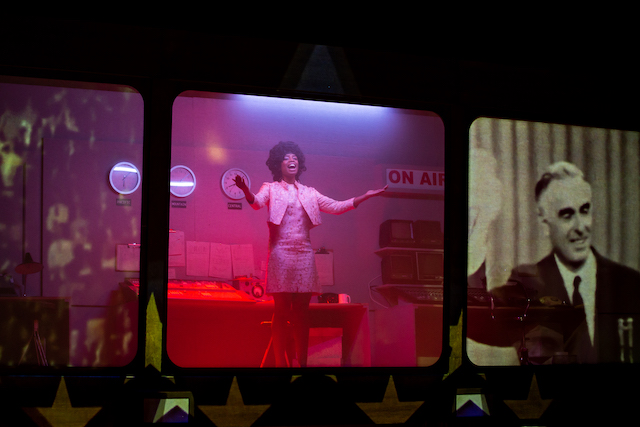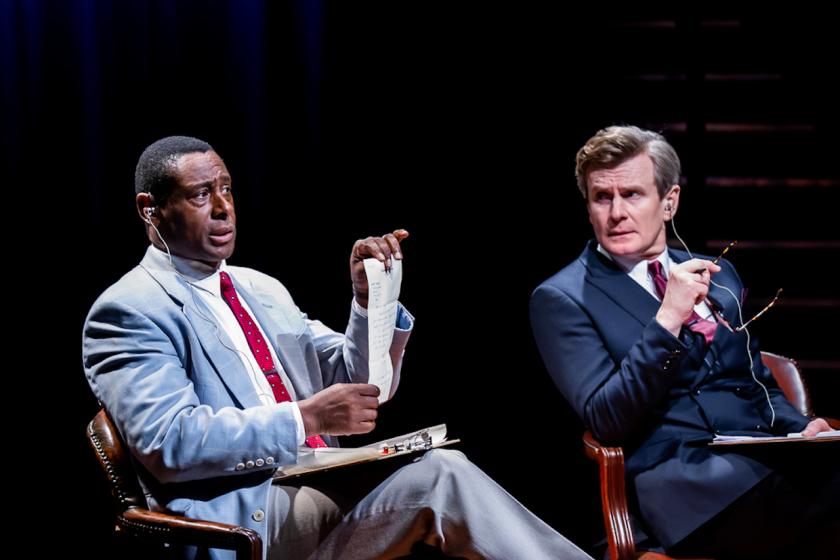No playwright has a scalpel as sharp as James Graham’s when it comes to dissecting politics; he has a brilliance and edge that strips away all unnecessary material till the beating heart of the matter is revealed. His latest tour de force takes the pulse of 1968 America where – against a backdrop of anti-Vietnam protests and outrage at the assassination of Martin Luther King – right wing polemicist, William F Buckley, is embarking on a series of TV debates with liberal Gore Vidal.
Graham’s fondness for origin stories is well-chronicled. Ink, for instance, his play about the rise of Rupert Murdoch, was simultaneously an investigation of populism and Brexit. In the same way, this fast-paced portrait of the clash between two titanic egos is an analysis of how TV transformed politics; if it weren’t for the power of on-screen charisma, it’s subtly asked, would Boris Johnson even have had a shot at Downing Street?
Not that you need to pick up on any of this to enjoy the vivid recreation of the late Sixties in Jeremy Herrin’s beautifully observed production which opens behind the scenes at America’s ABC news. The channel is struggling; early on one of the characters quips “the best way to end the Vietnam War would be to broadcast it on our channel – it would be cancelled within the week”.
Those who have read Vidal’s wonderful essay On Flying, where he talks about being filmed flying a plane at the age of 11 (his father was a pilot) but being too terrified to talk to the camera, will chart his obsession with TV as dating from the Thirties. For Buckley, however, the TV was a necessary evil – his worry in 1968 was that it would cheapen his public image. In the play his wife teases him that he will become a “performing monkey” even as he demurs that he is a “public intellectual”.
The lightness of Graham’s touch belies the fact that he is at his best when chronicling people who are doing nothing less than change history – for better or worse (Dominic Cummings take a bow). In this Headlong production the walk-on parts feature everyone from Aretha Franklin (a vibrant, self-assured Justina Kehinde, pictured below) to James Baldwin (an eloquent, scene-stealing Syrus Lowe). Particularly striking is Tom Godwin’s vacant Andy Warhol, hilariously described by Vidal as the "first man I’ve met with an IQ below 60, yet he’s a genius".

Vidal and Buckley are appropriately played by two towering actors, the former by Charles Edwards, the latter by David Harewood. But this is also a clever game with time. Today no-one could blink at the fact that an actor who has played leading roles at the National Theatre and on Homeland should play Buckley. Yet while, by the late Sixties, Buckley was becoming increasingly outspoken in favour of civil rights, in his earlier career his racist views meant that it would have been interesting for him to discover that one day he would be played by a black man.
Bunny Christie’s slick design fetishises the retro-glamour of a Sixties TV studio. Monitors on museum-worthy film cameras flicker with what’s happening on the stage in front of then, while historic footage on the three screens at the top of the set is brilliantly echoed by the production’s actors. At the heart of the drama, as with so many Graham plays, is essentially what’s happening in one room. When that room’s a studio, with two people of the stature of Buckley and Vidal, he shows how the outcome creates tremors that resonate for decades.
Politics hounds will be more than familiar with the documentary by Morgan Neville and Robert Neville that inspired the play, and the outburst that made Buckley in particular question the wisdom of ever going on TV. Yet Graham is too canny a writer to make this any one protagonist’s victory. Vidal’s waspish wit, seductive worldliness and political connections would gain him iconographic status. Yet despite Buckley’s remorse, we are also made to ask questions about whether it’s preferable to be famous and insecure or certain of your convictions and loved.
Tom Gibbons’s sound design is a retro-delight, with everything from Aretha Franklin’s stunning, controversial rendering of the US anthem as soul to the edgy laments of the Velvet Underground. Luke Halls’s video design is just one in a seasonal display of video delights (he has also designed The Book of Dust at the Bridge Theatre), yet the news footage bestows an authenticity on proceedings for those who didn’t catch Walter Cronkite and Howard K Smith first time round.
There’s no shortage of wonderful escapist theatre around right now, but this is a bracing and thoroughly enjoyable look at the recent and very real past. Perfect not just for politics obsessives but for anyone fascinated by the vanities and delusions of what makes someone tick as a human.
@Hallibee1













Add comment